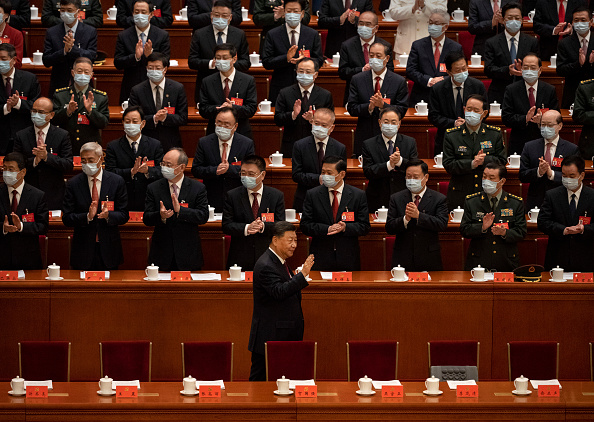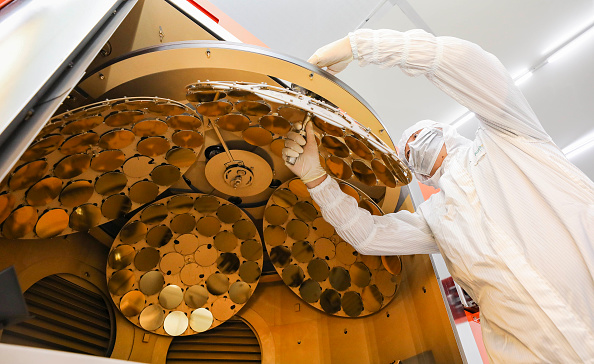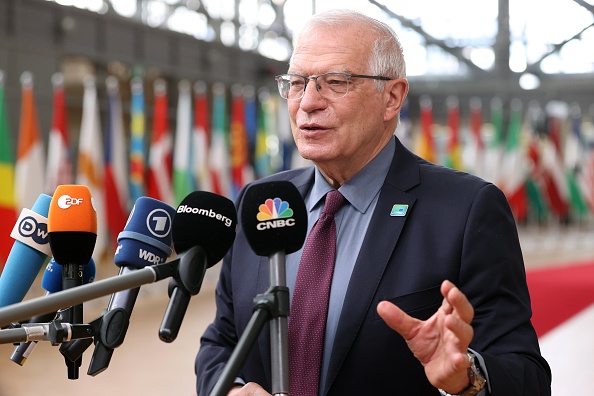
 United as Steel
United as SteelAs the 20th Party Congress officially commenced, Chinese President Xi Jinping called for accelerating the building of a world-class military, discussed the importance of economic development and stability, and signaled the continuation of the country's "zero-Covid" strategy. Xi's much anticipated speech framed China's foreign relations as a struggle between China and "external attempts to suppress and contain" it.
Roughly 2,300 delegates from around the country gathered in the Great Hall of the People, where Xi described the five years since the last party congress as "extremely uncommon and abnormal," during a speech that lasted less than two hours.
"We must strengthen our sense of hardship, adhere to the bottom-line thinking, be prepared for danger in times of peace, prepare for a rainy day, and be ready to withstand major tests of high winds and high waves," he said.
President Xi is expected to gain a third leadership term during the Congress, an unprecedented move that will cement his place as China's most powerful ruler since Mao Zedong. Xi called on all Chinese people to stay united as "a piece of hard steel" under the leadership of the Communist Party of China (CPC) and "pull together with one mind."
The Congress comes days after the Biden administration released a National Security Strategy that focused on China as "the only competitor with both the intent to reshape the international order and, increasingly, the economic, diplomatic, military and technological power to do it."
Read more in our series on the The 20th CPC Party Congress by Cheng Li, Director of the John L. Thornton China Center at The Brookings Institution.
 Strategic Needs
Strategic NeedsAfter the United States imposed a sweeping set of export controls that included measures to cut China off from certain semiconductor chips and chip-making equipment, President Xi Jinping vowed to develop strategically important core technologies, pledging that the country would become technologically self-sufficient.
The Biden Administration crackdown took aim at China's military ambitions and marked the most significant action by Washington against Beijing on technology exports in decades, escalating a trade battle between the world's two most powerful economies.
Speaking during the opening ceremony of the Party Congress, Xi stressed the importance of technological and scientific supremacy to building a strong and prosperous China.
"We will focus on national strategic needs, gather strength to carry out indigenous and leading scientific and technological research, and resolutely win the battle in key core technologies," Xi said.
China consumes more than three-quarters of the semiconductors sold globally, but produces only about 15% of global output, so some experts, including Brady Wang from Counterpoint, argue that the new rules will post a huge setback in China's advanced semiconductor industry and derivative technologies, including AI, supercomputers, training in self-driving, and more.
Read more in "Washington's Multilateral Export Control Impasse," by Joseph Vaughan, a Master's Student at Johns Hopkins University School of Advanced International Studies, and Justin Feng, a Graduate Student at Johns Hopkins School of Advanced International Studies.
 The Competition Increases
The Competition IncreasesWhile China's top leaders gathered in Beijing this week for the 20th Party Congress to discuss decisions that will impact China's relationship with the rest of the world, the EU's 27 foreign ministers also assembled in Luxembourg to begin the process of rethinking Europe's China policy.
"In the light of the current geopolitical context, we need to hold a strategic discussion on China," European Council chief Charles Michel wrote in his invitation. He also noted that leaders must establish "how we wish to frame this critical relationship in the future."
In the past, the EU has simultaneously considered Beijing a "cooperation partner," "economic competitor," and "systemic rival," but some leaders are arguing that it's time to toughen up its attitude and approach, and view the country as an "all-out competitor with limited areas of potential engagement," including EU foreign policy chief Josep Borrell.
A paper prepared for member states by the bloc's foreign service emphasized that the EU should work more closely with the U.S., strengthen its cyber and hybrid threat defenses, diversify its supply chains away from China, and deepen ties with other Indo-Pacific powers.
"Dependency" was discussed this week as well, highlighting that Europe must decrease its dependency on China [and Russia] by diversifying supply chains for technologies and critical raw materials, and avoiding new vulnerabilities.
An EU diplomat noted that most ministers are "on the same page," agreeing that the "relationship with China is shifting more toward competition and rivalry, even though they're still keen to highlight partnership, especially on climate change," according to an interview with Politico.
Prepared by China-US Focus editorial teams in Hong Kong and New York, this weekly newsletter offers you snap shots of latest trends and developments emerging from China every week, while adding a dose of historical perspective.
- 2022-10-14 Party Time
- 2022-10-07 Elections Incoming
- 2022-09-30 Hot Intrigue
- 2022-09-23 Global Gridlock
- 2022-09-16 Injecting Stability
- 2022-09-09 Cutting Edges
- 2022-09-01 A Win for Global Business
- 2022-08-26 A Heavy Price
- 2022-08-19 Risky Business
- 2022-08-12 Backtracking
- 2022-08-05 Cross-Strait Outrage
- 2022-07-29 Playing with Fire
- 2022-07-22 Nixonian Flexibility
- 2022-07-15 List Diplomacy
- 2022-07-08 Easing Tariffs, Not Tensions
- 2022-07-01 Getting Tough
- 2022-06-24 Tools in the Box
- 2022-06-17 Unprecedented Oversight
- 2022-06-10 Squaring Off
- 2022-06-03 Diplomatic Chills
